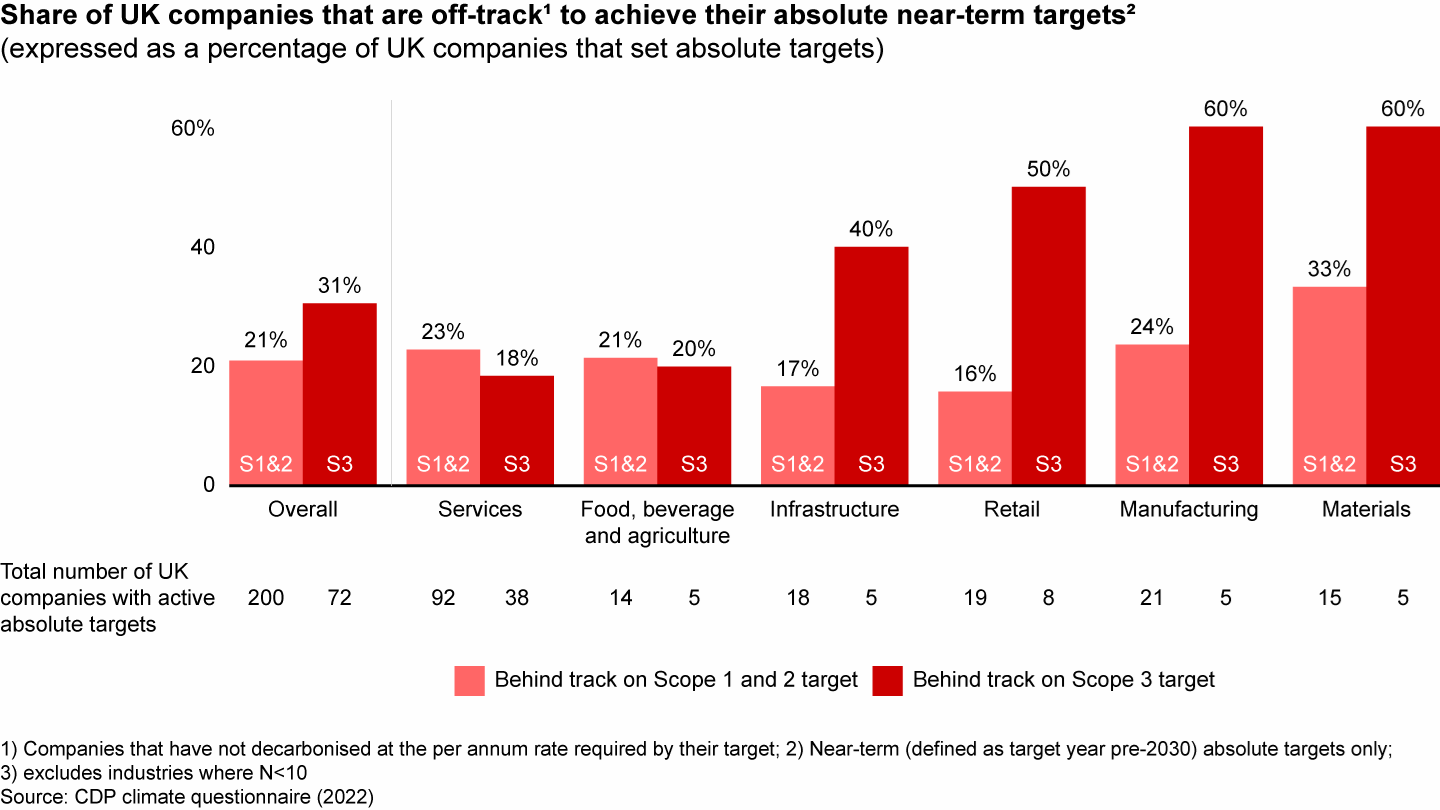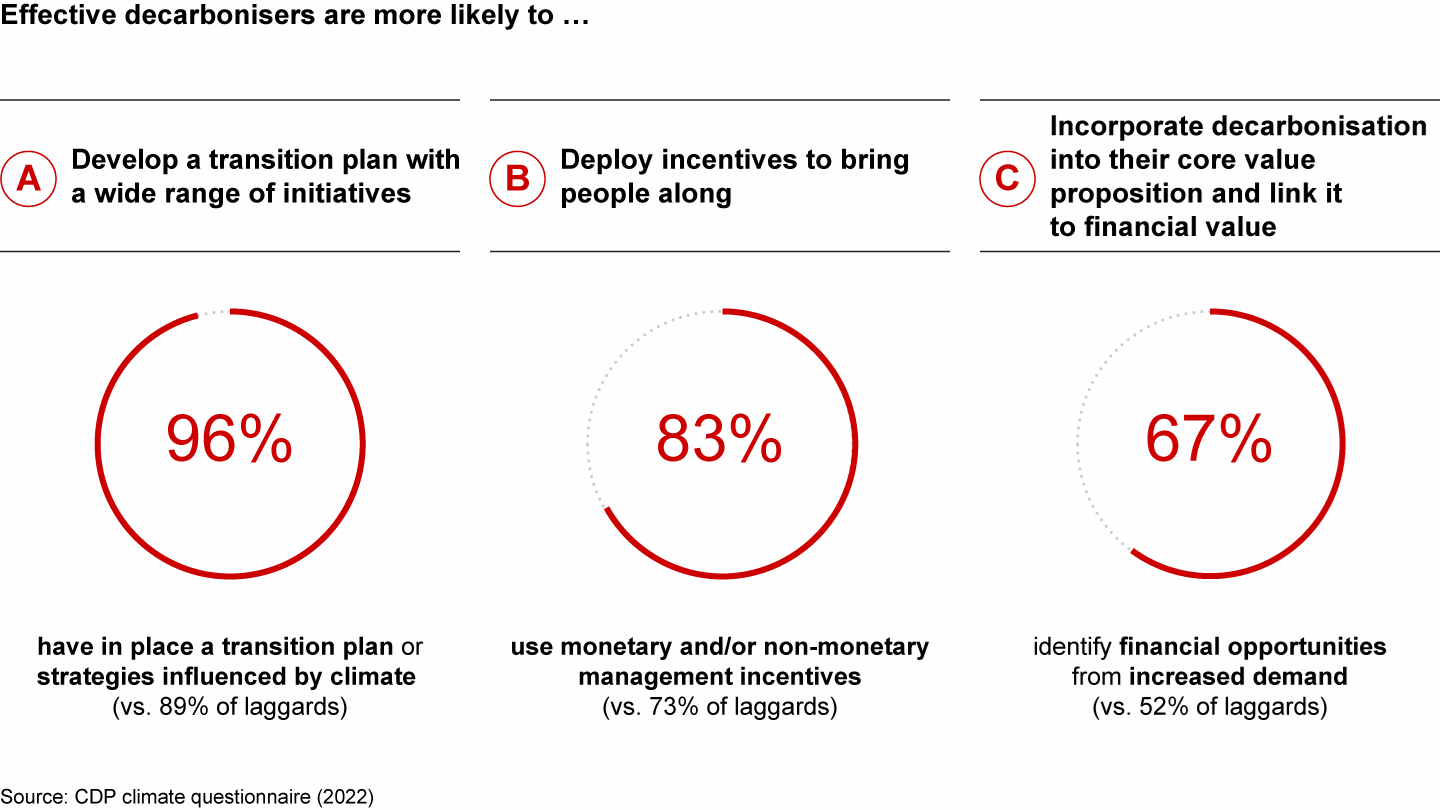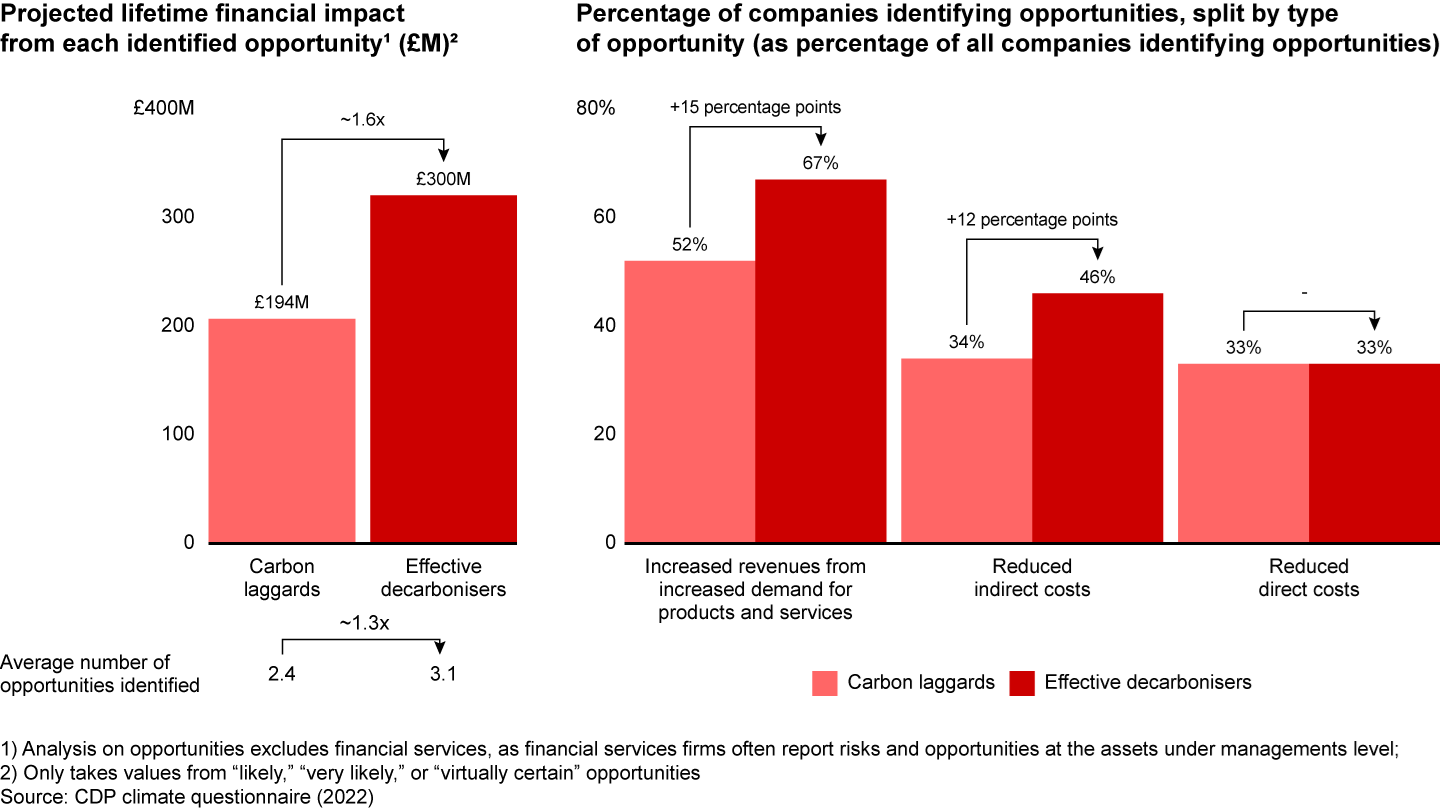Brief

UK corporations face significant pressure to make progress on decarbonisation. Simply setting targets is no longer enough. Regulators, investors, and customers are increasingly expecting corporations to have more robust carbon emission measurements, proof of delivery against decarbonisation targets, and a better understanding of how to decarbonise in a way that generates financial value.
Written in collaboration with
Written in collaboration with

Measure: Many UK companies are still early in the journey of measuring and disclosing their climate impact. Of the approximately 1,450 UK-headquartered companies that disclosed through CDP on climate (including approximately 91% of FTSE 100 companies), only around 70% of those disclosed actual Scope 1 and 2 emissions data. Only around 50% disclosed Scope 3 emissions data, of which approximately one-third use no primary data to calculate emissions. Though some of this is promising, success requires companies to understand and quantify their emissions across all scopes. CDP’s supply chain membership program can help companies collect primary Scope 3 data, analyse it, and engage with their suppliers to reduce their Scope 3 emissions.

Set Targets: Target-setting is on the rise, but is still limited. A growing number of UK companies are setting decarbonisation targets, with an average 52% per annum growth in target-setting from 2020 to 2022. The targets set are ambitious, with an average of approximately 6.5% per annum absolute reduction in Scope 1 and 2 emissions, which is above the 4.2% per annum reduction required for the Science-Based Targets Initiative’s 1.5°C pathway. However, only around 26% of UK companies disclosing through CDP have active Scope 1 and 2 targets. This falls further for Scope 3, to only around 15% of UK companies. As a result, targets only cover 31%–36% of the base year emissions reported by UK corporations. Target-setting is clearly still insufficient.
Deliver: Delivery of targets is challenging. Companies are not always underpinning their decarbonisation commitments with robust, quantified, and costed transition plans. This manifests in under-delivery: of the UK companies that disclosed through CDP and that have targets, 26% failed to meet their targets for 2021 and around 20%–30% are off-track against their pre-2030 targets. This challenge is seen across industries, particularly on Scope 3. Once all companies are accounted for—even those not disclosing—the scale of the challenge is far larger.
20%–30% of UK companies are off-track to achieve their targets


To successfully decarbonise, companies need to embed decarbonisation into their core business and link it to financial value.
To understand what it takes to decarbonise, we analysed the practices of companies that have effectively done so. We defined “effective decarbonisers” as the companies whose progress is aligned to the 1.5°C pathway (i.e., decarbonising their absolute Scope 1 and 2 emissions by 4.2% or more per annum).
Though there is no silver bullet to decarbonisation, we found that effective decarbonisers proactively embed decarbonisation into their core business and link it to financial value.
Specifically, effective decarbonisers: a) develop a transition plan with a wide range of initiatives, b) deploy incentives to bring people along, and c) incorporate decarbonisation into their core value proposition and link it to financial value.
Decarbonisers embed decarbonisation in their core business and link it to value creation


However, above and beyond simply having a transition plan, the quality and robustness of the transition plan is of critical importance. In February 2023, CDP released a transition plan report which analyses the credibility of companies’ transition plans and found that less than 1% of the entire disclosure sample in 2022 reported sufficient detail to all 21 key indicators that align with a credible climate transition plan.
Companies that link decarbonisation to value expect to see financial benefit from their efforts.
Decarbonisation can create value from multiple sources: cost reduction, regulatory benefits, risk avoidance, access to financing, talent proposition, valuation, and revenue upside. CDP data shows that effective decarbonisers are likely to capture financial benefit from their efforts. They identify more financial opportunities from decarbonisation overall, identify higher value financial opportunities—and are particularly more likely to identify revenue-based growth opportunities from increased demand.
Effective decarbonisers expect to capture potential financial value for their efforts


Recommendations for UK corporations
Measure: Disclose on Scopes 1, 2, and 3 and collect primary data to calculate Scope 3. Stakeholders are increasingly expecting companies to quantify and disclose carbon emissions.
Set Targets: Set a target for Scope 1 and 2 emissions (ideally an absolute target) and for Scope 3 as well (especially if Scope 3 represents a significant percentage of emissions). Underpin targets with quantified decarbonisation levers and use clear measurement to monitor (and project) progress against targets.
Deliver: Embed decarbonisation into your core business and link it to value.
- A. Develop a transition plan with a wide range of initiatives. For example, create a publicly available transition plan across Scopes 1, 2, and 3.
- B. Deploy incentives to bring people along. For example, deploy financial incentives for your executive and management teams and put an internal carbon price in place for several years.
- C. Embed decarbonisation to your core value proposition and link to financial value. For example, proactively search for green pricing premiums from existing products and/or monetize new low-carbon products.
By taking these actions to decarbonise, UK companies can drive better climate and financial outcomes.

About CDP
CDP is a global non-profit that runs the world’s environmental disclosure system for companies, cities, states and regions. Founded in 2000 and working with more than 740 financial institutions with over $136 trillion in assets, CDP pioneered using capital markets and corporate procurement to motivate companies to disclose their environmental impacts, and to reduce greenhouse gas emissions, safeguard water resources and protect forests. Over 24,000 organizations around the world disclosed data through CDP in 2023, with more than 23,000 companies—including listed companies worth two thirds global market capitalization—and over 1,100 cities, states, and regions. Fully TCFD-aligned, CDP holds the largest environmental database in the world, and CDP scores are widely used to drive investment and procurement decisions towards a zero carbon, sustainable, and resilient economy. CDP is a founding member of the Science Based Targets initiative, We Mean Business Coalition, The Investor Agenda, and the Net Zero Asset Managers initiative. Visit cdp.net or follow @CDP to find out more.